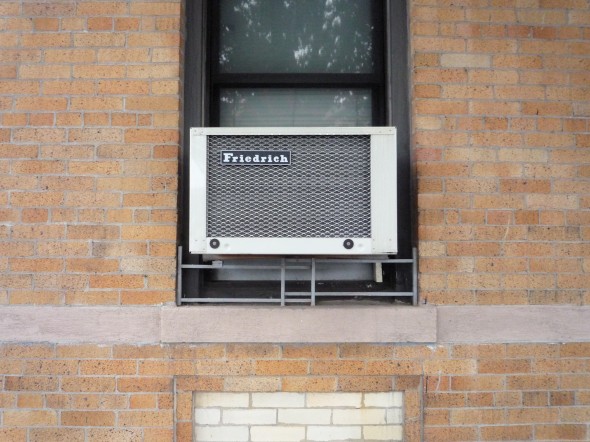Renting & Air Conditioning: Protections for Oregonians
Posted on August 4, 2022 by Kate Ayres
Tags, Energy, General Interest

As we’ve faced another summer of high temperatures, more people are looking at air conditioning options. It is important for Oregonian residents, and especially renters, to have updated information on their rights. The Emergency Heat Relief bill (SB 1536) passed in the 2022 Oregon State legislative session to help expand cooling rights for renters.
Expanded Rights for Renters
This new law changed the rights renters have to access cooling devices. It also supported funding for the distribution of units to low-income households. Being able to access cooling devices can be life or death, as we saw last summer with the heat dome and again this year.
The Emergency Heat Relief law limits landlord restrictions on the use of portable cooling devices between May and September each year. The bill defines “portable cooling devices” as, “air conditioners and evaporative coolers, including devices mounted in a window or that are designed to sit on the floor.” This does not include devices that would require alteration of the home itself.
This means that, with a few exceptions, landlords can no longer ban window units or portable A/C units for renters.
Potential Restriction Information
Housing providers may not prohibit or restrict residents from installing or using residents’ preferred cooling device unless it fits one of the following restrictions:
The installation or use of the device may not:
- Violate building codes or state or federal law
- Violate the device manufacturer’s written safety guidelines for the device
- Damage the premises or render the premises uninhabitable
- Require amperage to power the device that cannot be accommodated by the power service to the building, dwelling unit, or circuit
If the device is to be installed in a window, it may not:
- Be installed on a window that is a necessary egress (emergency exit) from the home
- Interfere with the resident’s ability to lock the window if it is accessible from outside
- Require the use of brackets or hardware that would damage or void the warranty of the window or frame, puncture the envelope of the building, or cause significant damage
- Be used without adequately draining the device to prevent damage to the unit or building
- Be installed in a way that does not prevent risk of falling
Optional - Housing providers may require that the device be:
- Installed or removed by the housing provider or housing provider’s agent
- Subject to inspection or servicing by the housing provider or house provider’s agent
- Removed from October 1 to April 30
Housing providers may only enforce the optional restrictions listed above if they provide a written list of restrictions to the residents. This letter must also state if the housing provider intends to operate an optional community cooling space.
How to Access Cooling Devices (Low-Income Programs)
This bill’s passing also opened up investment opportunities in a variety of programs to help provide information to Oregonians about extreme heat events and cooling centers, as well as the distribution of cooling devices.
The Portland Clean Energy Fund (PCEF) has been organizing important information designed to connect vulnerable low-income populations in Portland to efficient portable heating and cooling devices. PCEF has worked with community organizations to distribute these devices. The heating and cooling devices being distributed are available to Portland residents at or below 60 percent State Median Income (SMI).
For full details on the programs available to low-income Portland residents, please visit the PCEF website. On the website, you will find information on the program goals, program partners, eligibility requirements, and information on how to get connected to partner organizations.
If you meet the income requirements and are interested in contact information for the partner organizations that are distributing cooling devices you can find links to the program pages through Earth Advantage’s website. Currently, the African American Alliance for Homeownership (AAAH) and Verde are organizations taking intake forms. The Asian Pacific American Network of Oregon (APANO) will soon be able to distribute these devices as well. The website also has a list of housing providers that can qualify eligible residents living in their communities.
The program will continue in 2023 with more units being ordered and installed into low-income residential dwellings.
CUB Will Continue to Advocate for Renters
In 2022, the Emergency Heat Relief Bill passed with CUB’s support and the support of our members. We will continue to push for laws and regulations to support safe and energy-efficient housing for all Oregonians, particularly those who rent.
For questions on the information in this blog, contact CUB at .(JavaScript must be enabled to view this email address) or 503-719-8744.
To keep up with CUB, like us on Facebook and follow us on Twitter!





08/04/22 | 0 Comments | Renting & Air Conditioning: Protections for Oregonians